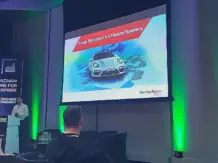Automation through the blockchain requires data as a prerequisite. One of the promises of collecting and transporting this data at affordable costs the Internet of Things. And for Sigfox, the logistics is an ideal candidate for these technologies.
Different sectors, such as logistics and the supply chain, are looking for automation to gain operational efficiency. To do this, they strive to digitize an increasing part of their operations. The Internet of Things and Connected Objects can meet these challenges by collecting data and automating processes.
This data can then be shared with industrial partners through the blockchain, as for example in the field of trade finance. These uses represent a development potential for an actor like Sigfox and its network IoT.
Collect data to decide and automate
"The IoT allows us to go up a lot of data and for a fairly limited cost. Until now, for customers, connecting devices or objects, for example a pallet in logistics, was considered too expensive. Our positioning is therefore a global network enabling data to be collected as cheaply as possible, "said Patrick Cason, France’s general manager of the operator.
It is this data that then makes automation possible through the blockchain. Applications can thus be envisaged in the fields of logistics and the supply chain. Especially since these sectors often involve a large number of different stakeholders with whom the exchange of trusted data is of obvious interest.
An ocean container sent from a city in France to Asia, or elsewhere in the world, passes on average through 27 separate companies. The IoT allows you to have information independently of conventional information systems, and this in near real time, "illustrates the director of Sigfox.
Blockchain TradeLens, developed in the maritime sector, seeks to respond to these different challenges. But this is also the case more widely in the field of international trade and its financing. Complexity, trust and low digitization are at the origin of the creation of blockchain consortia like Komgo and we.trade.
Logistics: no "advances for more than 40 years"
At the end of 2019, a pilot also assembled the transporter Cosco, the Shanghai International Port Authority, the automaker You're here and the technology supplier CargoSmart. These companies therefore tested a blockchain application aimed at transforming the cargo release process.
Of air transport players are also exploring the uses of blockchain for container tracking and data exchange. These companies, united within the Global Blockchain Alliance, estimate that tracking and sharing container data on the blockchain would generate annual savings of $ 400 million.
For Patrick Cason, the benefits of IoT, combined with blockchain, are more broadly of interest in providing useful information for decision-making. "Having a digital platform bringing together a certain number of third parties, on private or public blockchains, makes it possible to make decisions, to offer services and therefore to open up a whole new pan business. "
And if the potential is perceived as very significant in logistics, it is due to the absence of "advances in this sector for more than 40 years. The IoT is a game-changer. It is no coincidence that groups like Michelin, Airbus or Total use IoT data for their logistics operations. "
Insurance and luggage: services for consumers
Data collection via the internet of things is therefore a first step, making it possible to use other technologies such as blockchain or artificial intelligence. The supply chain is not the only possible outlet for IoT and blockchain, however.
So, Sigfox has partnered with Parisienne Assurance to design a connected object allowing to go up data on its 0G network. This information is used by the insurer in the context of a new mobility insurance contract, the cost of which is invoiced according to the actual use of a vehicle.
Patrick Cason also imagines possible uses for consumers. In the air, Sigfox created a joint venture in 2019 with Amadeus to provide luggage tracking.
In case of baggage loss, a notification could be sent through a mobile application to directly inform the traveler, ”quotes the manager.
And these baggage detection and consumer information operations could be automated thanks to the blockchain.















